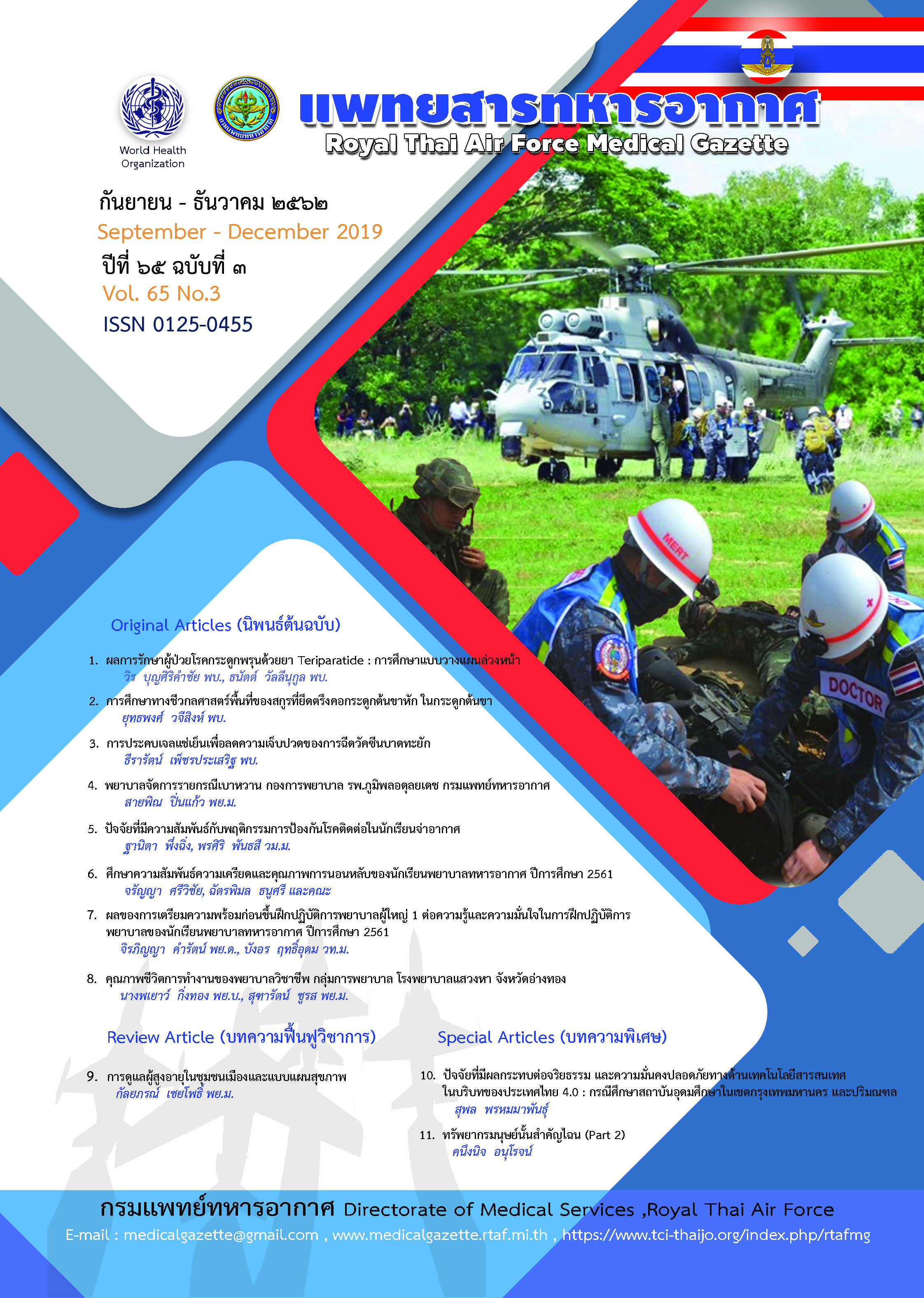The Factors that Affect to Ethics and Security in Information Technology in the Context of Thailand 4.0: A Case Study Higher Education Institutions in Bangkok and Perimeter
Main Article Content
Abstract
The objective of this research is to identify the factors that can be divided into 5 areas: Including knowledge and understanding of Information Technology Knowledge and understanding about the Act (Act) on Social, Economic and Behavior using computer and Social media.
The results of the research concluded that An overview of the factors that have an impact on Ethics and information security all 5 areas at a high level with an average of 3.72 by the highest value is behavior using computer and Social media with an average of 3.98 at a high level show that Learning behavior of people in society has changed by turning to use computers and social media more, whether it’s Google Facebook Line YouTube followed by social area with an average of 3.96 at the same level by using online media to create interaction with other people Including entertainment such as watching movies and online videos. The lowest mean value is the knowledge and understanding about the Act (Act) is at a moderate level, which indicates that some people still lack knowledge and understanding about the Act (Act) such as the Computer Crime Act.
Article Details
บทความที่ได้รับการตีพิมพฺเป็นลิขสิทธิ์ของวารสาร
References
วันที่ 30 มิถุนายน 2560, จาก www.prachachat.net/news
2. พระราชวรมุนี (ประยุทธ์ ปยุตโต). “ความหมายของจริยธรรม”. 2562. สืบค้นเมื่อวันที่ 31 มีนาคม 2562,
จาก www.baanjomyut.com
3. คึกฤทธิ์ ปราโมช, ม.ร.ว. “ความหมายของจริยธรรม”. 2562. สืบค้นเมื่อวันที่ 31 มีนาคม 2562, จาก www.baanjomyut.com
4. วศิน อินทสระ. “ความหมายของคุณธรรมจริยธรรม” 2562. สืบค้นเมื่อวันที่ 31 มีนาคม 2562,
จาก http://first66bobo.blogspot.com.
5. โสคราติส. “แนวคิด หลักการ ทฤษฏีทางคุณธรรม จริยธรรม” 2560. สืบค้นเมื่อวันที่ 13 กรกฎาคม 2560,
จาก http://www.baanjomyut.com/library
6. เพลโต. “แนวคิด หลักการ ทฤษฏีทางคุณธรรม จริยธรรม” 2560. สืบค้นเมื่อวันที่ 13 กรกฎาคม 2560,
จาก http://www.baanjomyut.com/library
7. อริสโตเติล. “แนวคิด หลักการ ทฤษฏีทางคุณธรรม จริยธรรม” 2560. สืบค้นเมื่อวันที่ 13 กรกฎาคม 2560,
จาก http://www.baanjomyut.com/library
8. Gary BS. (Gary B. Shelly). “Discovering Computers 2006: A Gateway to Information, Web Enhanced
Introductory” Thomson Course Technology, 2006.
9. Jame O “Management Information Systems” Eighth Edition, McGraw-Hill Irwin, 2008.
10. ลัดดา โกรส. “แนวคิดเกี่ยวกับการจัดการเทคโนโลยีสารสนเทศ”. 2010. สืบค้นเมื่อวันที่ 11 มีนาคม 2010,
จาก http://www.mua.go.th
11. สุพล พรหมมาพันธุ์. “กลยุทธ์การใช้เทคโนโลยีสารสนเทศและการสื่อสาร สำหรับการแข่งขันของ มหาวิทยาลัยเอกชน” การประชุม
วิชาการระดับชาติ ประจำปี 2555 สมาคมสถาบันอุดมศึกษาเอกชนแห่งประเทศไทย (APHET CONFERENCE 2012).
12. วีพี (WP). สถิติผู้ใช้ดิจิทัลทั่วโลก “ไทยเสพติดเน็ตมากสุดในโลก-กรุงเทพ” เมืองผู้ใช้ Facebook สูงสุด, 2562. สืบค้นเมื่อวันที่ 20
มกราคม 2562, จาก www.brandbuffet.in.th
13. ศุกรีย์ ศรีสารคาม. “ปัจจัยที่มีผลต่อคุณธรรมจริยธรรมในการใช้อินเทอร์เน็ต”. 2557. สืบค้นเมื่อวันที่ 21 มกราคม 2561, จาก
www.repository.rmutt.ac.th/bitstream/.../RMUTT-106601.pdf?
14. สาวิตรี สุขศรี และคณะ. “ผลกระทบจากพระราชบัญญัติว่าด้วยการกระทำความผิดเกี่ยวกับคอมพิวเตอร์ พ.ศ. 2550 และนโยบาย
ของรัฐกับสิทธิเสรีภาพในการแสดงความคิดเห็น” โรงพิมพ์ภาพพิมพ์, 2555:261-2.
15. Narongyod Mahittivanicha. 2019, Digital Marketing Consultancy. Retrieved January 20, 2019, from
www.twfdigital.com.
16. ชาญวิทย์ พรนภดล, “เปิดวิจัย Cyberbullying เยาวชนไทยกับความเสี่ยงยุค 4.0” หนังสือพิมพ์ประชาชาติธุรกิจ: 2561:21.
17. ณัฐนันท์ ศิริเจริญ. “รูปแบบการสื่อสารเพื่อการรู้เท่าทันสื่อและสารสนเทศจากสื่ออินเทอร์เน็ตของเยาวชนไทย.” วารสารศรีปทุม
ปริทัศน์ ฉบับมนุษยศาสตร์และสังคมศาสตร์. 2558. ปีที่ 15, ฉบับที่ 1:52-3.


